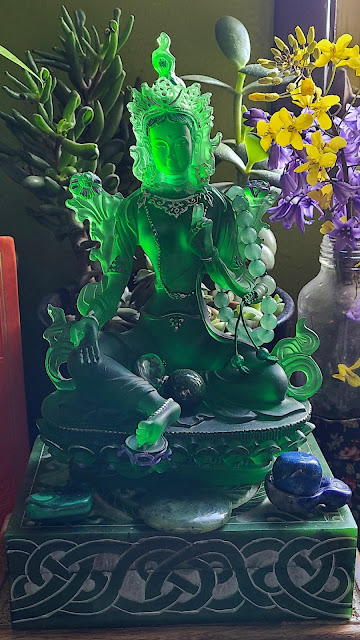Google says May 6th, this Friday, but "dates may vary". I think that may be when Korean International Lotus Lantern Parade is, but I can't get any information.
May 16th when it's the full moon? "Nowadays, in Sri Lanka, Nepal, India, Bangladesh and Malaysia, Vesak/Buddha Purnima is celebrated on the day of the first full moon in May in the Gregorian calendar." (Wikipedia) But "In China, Korea, Vietnam and the Philippines, Buddha's Birthday is celebrated on the eighth day of the fourth month in the Chinese lunar calendar. In Japan, Buddha's Birthday is observed on the same date but in the Gregorian calendar, i.e. 8 April."
International Vesak day is May 16th.
As someone who celebrates all the traditions (and perhaps therefore none) I'll go with international Vesak Day. Triratna says May 16th, my root sangha.
Gathering with sangha is the first suggestion.
If you're alone celebrating, the suggestion of activities is:
Cleaning home and body.
Burn incense if you have it.
Chant Sutras and do pujas.
Cook special meals. Consider a special tea to drink. No meat, consider plant based meals.
Lead a minimalist life, consider abstention from sex and internet.
Meditation. Consider Buddhananasati meditation where you invoke the Buddha.
Consider doing nice things for others. Create art, plan an activity.
Offerings to the shrine: light, flowers, and other offerings.
My one experience of gathering with the larger NYC sangha was at Shambhala many many years ago. Little Sri Lankan kids recited things. A Japanese monk did calligraphy. A Korean monk spoke. There was social mixing, where I asked a guy what color robe he had--he practiced in 2 traditions and made up his own robe.
I'm not sure what the appropriate response in the USA would be in engaged Buddhism. I read about what happened in Vietnam when the Buddhist flag was banned: In 1963, the South Vietnamese President Ngo Dinh Diem, a Catholic and younger brother of Archbishop Ngo Dinh Thuc banned the flying of the Buddhist flag. This led to a demonstration and flag-waving in defiance of the ban. Diem's forces opened fire on the Buddhist crowd, killing nine, sparking the Buddhist crisis, a period of civil disobedience against religious discrimination.
I'm concerned about the health of democracy in the USA and the further Talibaning and Christo-fascist elements. It looks like Roe v Wade might be overturned by SCOTUS. Go look at Gerri Santoro and tell me that banning abortion is the right thing to do.
I know Buddhism doesn't pick a party or politics in a way, but in another way the journey of trying to prevent harm to others is important. Climate and environmental activism doesn't have to be political, it's acting in our own best interest. And our children's interest. Future thinking is important I think.













